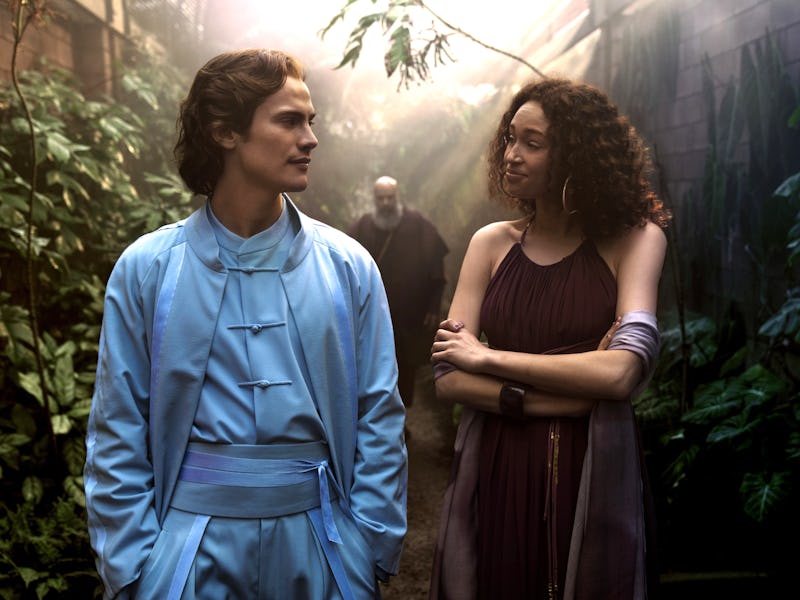Foundation Is Fixing The Trickiest Thing About the Asimov Books
Isaac Asimov was a science fiction giant. But the version of Foundation addresses one place the books fell short.

The Foundation novels by Isaac Asimov may very well be one of the best science fiction book series of all time. And, the current Apple TV+ series based on those books is easily one of the top five best contemporary sci-fi TV shows airing right now, period. But, what makes Foundation unique among sci-fi book adaptations is that it dramatically improves upon its source material, and outright corrects aspects of the novels which simply don’t work today. In the fifth episode of Foundation Season 2, one of the most powerful characters in the show, Queen Sareth (Ella-Rae Smith) challenges the Emperor of the Galaxy, Brother Day, in a way that characters from Asimov’s books never could.
Like Season 1 before it, Foundation Season 2 pushes back against one of the things that make the classic novels tricky for contemporary audiences; the novels often lack strong female characters, which is something the show tackles head-on, especially in Season 2, Episode 5, “The Sighted and the Seen.” Spoilers ahead.
Queen Sareth Challenges Cleon
In one pivotal scene from “The Sighted and the Seen,” Queen Sareth (Ella-Rae Smith) challenges Brother Day (Lee Pace) about their impending arranged marriage. In the tense scene (watch the exclusive clip from Apple above!) Sareth makes it clear to Day that she’s only interested in marrying him and having an heir because it’s good for her kingdom, Cloud Dominion.
In the books, Queen Sareth doesn’t exist, and although there is a Cleon I in Asimov’s prequel books, Prelude to Foundation and Forward the Foundation, he’s not a serial clone in those novels, and the inherent patriarchy he creates isn’t addressed at all. In fact, overall, Asimov’s novels contain few strong female characters at all, specifically in the original three novels of the “trilogy,” Foundation, Foundation and Empire, and Second Foundation. While it’s true that the Foundation and various powers do destabilize the Empire in the classic books, there wasn’t a great character like Queen Sareth at the center of it. Just the existence of this character not only creates an amazing foil to the Cleon dynasty in the show’s canon but provides an amazing counterbalance to the male-dominated novels.
Foundation’s feminism
Gaal in Foundation Season 2.
In addition to Sareth, one remarkable thing about Foundation is how it manages to side-step its male-focused source material to the point where it actually scans as a feminist show, at least, relative to the books. Heroic characters Gaal Dornick (Lou Llobel) and Salvor Hardin (Leah Harvey) were men in the books, but are women in the show. The near-immortal robot Demerzel was also presented as male in the books. But as played by Laura Birn on the show, Demerzel is the true power behind the toxic male Cleons, who actually only appear to be in power. As Queen Sareth is coming to learn, her enemy might not be Brother Day at all, but instead, Demerzel. So, the actual power struggle, at least on the galactic stage, isn’t between Hari Seldon and Empire, but instead, between Sareth and Demerzel.
Meanwhile, on the other side of the galaxy, Gaal and Salvor may have to contend with Hari Seldon’s eccentricities, but it’s become rapidly clear that Gaal’s agency is superior to Hari’s. “You’ve never really seen a sci-fi character like her before,” Lou Llobel told Inverse before Season 2 aired. “She gets so much put on top of her. So much responsibility ... it can be isolating for her, as she was in Season 1. But, it’s different now.”
Unlike Season 1, Gaal’s mentor Hari is unmoored and without answers, which was something Jared Harris intended in his performance in Season 2. Instead of being the all-knowing old man with the answers, the version of Hari we see in “The Sighted and the Seen,” is having to face his own arrogance. “He's obviously more vulnerable,” Harris told Inverse (prior to the SAG-AFTRA strike). “I was trying to get away from the idea that he knows everything because that just sucks all the dramatic possibility out of every single scene.”
This last point from Harris actually sums up what makes Foundation Season 2 so compelling. In a show that is about predicting the future, we don’t know what is going to happen next. Right now the only thing we do know is that the intellectual brilliance of Asimov’s books continues to shine through. Only now, Foundation is no longer just a boy’s club.
Foundation is streaming on Apple TV+.
This article was originally published on